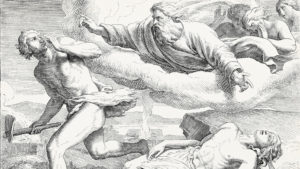Paradigm Setting

I’ve been thinking a lot about the story of Cain and Abel. It’s obviously a very important story, being one of the stories in the first part of Genesis that sets the paradigm for our understanding of reality, as with Creation, the Fall, the Flood, and the Tower of Babel. To our ears it can come off as just an instance of hate among brothers, culminating in murder, so we might take away only the idea that our hearts are desperately wicked such that we are in need of a Savior.
But surely there is more to it than that. What specifically provokes Cain?
“Now Abel was a keeper of sheep, and Cain a worker of the ground. In the course of time Cain brought to the Lord an offering of the fruit of the ground, and Abel also brought of the firstborn of his flock and of their fat portions. And the Lord had regard for Abel and his offering, but for Cain and his offering he had no regard.”
Genesis 4 (ESV). Does God love meat offerings more than plant offerings? That can’t be right. It’s clearly the state of our heart that matters to God. So why would God be pleased with Abel’s offering but not Cain’s?
“Doing Well”
God rebukes Cain for his anger: “If you do well, will you not be accepted?” So it’s not the substance of the offering that is the problem, but the character of the offeror. What does it mean to “do well?” Just not sin? I think there’s more to it, but this story as it’s laid out in Genesis is not self-contained in such a way that we can fully grasp it without looking elsewhere in written revelation. This story by itself is quite cryptic.
I suggest a meaning that goes beyond binary understandings of good/bad, right/wrong, and sin/punishment. Man does not achieve perfection on his own, obviously, and we need a Savior precisely because evil is bound up in our humanity ineluctably, in this life. So “doing well” could mean abiding with God; finding our rest in Him; being mindful of the mysterious conjunction between our spirits and His.
Cain doesn’t reject God. The story takes place in the context of Cain trying to worship God. We can assume from the tidbit we’re given that Cain is doing it with a heart not wholly abandoned to God, however. Cain might even be doing it with some residual resentment that there is a Being greater than he.
But it could also be something more subtle than that. Cain could be trying to genuinely worship God on his, Cain’s, own terms, but not be trying to abide with Him. Cain may be attempting to find his rest, his peace, apart from God.
 I think I’m a bit of Cain myself. I worship God and I pray to God and I am grateful to God, most of all for taking the initiative to reconcile me to Himself in Christ. But I want to do things my way. I don’t have an easy sense of fluid harmony with the Lover of my soul. I struggle with Him, like Jacob did, in Genesis 32. I puzzle over Jesus’ explanation, in John 15, that He is the vine and I am to be a branch of the vine; that there is to be a growing, living spiritual connection, not merely a master-servant relationship in which my job is just to obey.
I think I’m a bit of Cain myself. I worship God and I pray to God and I am grateful to God, most of all for taking the initiative to reconcile me to Himself in Christ. But I want to do things my way. I don’t have an easy sense of fluid harmony with the Lover of my soul. I struggle with Him, like Jacob did, in Genesis 32. I puzzle over Jesus’ explanation, in John 15, that He is the vine and I am to be a branch of the vine; that there is to be a growing, living spiritual connection, not merely a master-servant relationship in which my job is just to obey.
It seems that there is to be a kind of harmony involved, and the mental picture I keep having is a dance in which the partners move either in harmony or disharmony. There is order and beauty, or disorder and awkwardness. I willingly participate in the dance, but am I fighting God’s leading in it?
Walk in Beauty
This may sound like a long way around, but bear with me. I’ve long been intrigued with Native American perceptions of metaphysical reality. They are highlighted in the civilizational clash with European Americans holding a Christian worldview, in the 18th and 19th centuries. Sometimes the Indian religious sensibility is summarized or even written off as pagan or animist or pantheist, but there is a limitation, I suggest, to this kind of categorizing.
 There seems to be a kind of Cain-and-Abel paradigm among most Indian outlooks, too. The Navajo, for example, hold to a concept of walking in beauty, but by “beauty” they don’t mean merely a heightened aesthetic sensibility. They mean also finding and maintaining order from disorder; emotional happiness from strife; health from debility; a sense of unity and belonging with one’s people. This state of mind is not something to search out and seize, but rather something to absorb from the universe around them. It means a sense of connection across time, to the past and to the future. By transcending time into timelessness, one enters the spiritual realm.
There seems to be a kind of Cain-and-Abel paradigm among most Indian outlooks, too. The Navajo, for example, hold to a concept of walking in beauty, but by “beauty” they don’t mean merely a heightened aesthetic sensibility. They mean also finding and maintaining order from disorder; emotional happiness from strife; health from debility; a sense of unity and belonging with one’s people. This state of mind is not something to search out and seize, but rather something to absorb from the universe around them. It means a sense of connection across time, to the past and to the future. By transcending time into timelessness, one enters the spiritual realm.
One walks in beauty not just because he is formally reconciled to his brother, but because he lives in harmony with the land and his people as they present to him, and not as he wishes to form them, in his own imagination and initiative. It’s not just peace with his brother that he is to seek. It is harmony with his brother and with all other living and non-living things: to move with them in a dance in which Spirit leads, and not he.
Rule-maker or Lover
By this borrowing of understanding, I come back to Cain and Abel. It’s not a story to be written off as another instance of showing us our depravity. I think it means also that we’re to understand that God is not just a God of rules, but is a God desiring a love relationship with us. He leads the dance, and we abandon ourselves to it, following the rhythm and creating beauty with Him.
